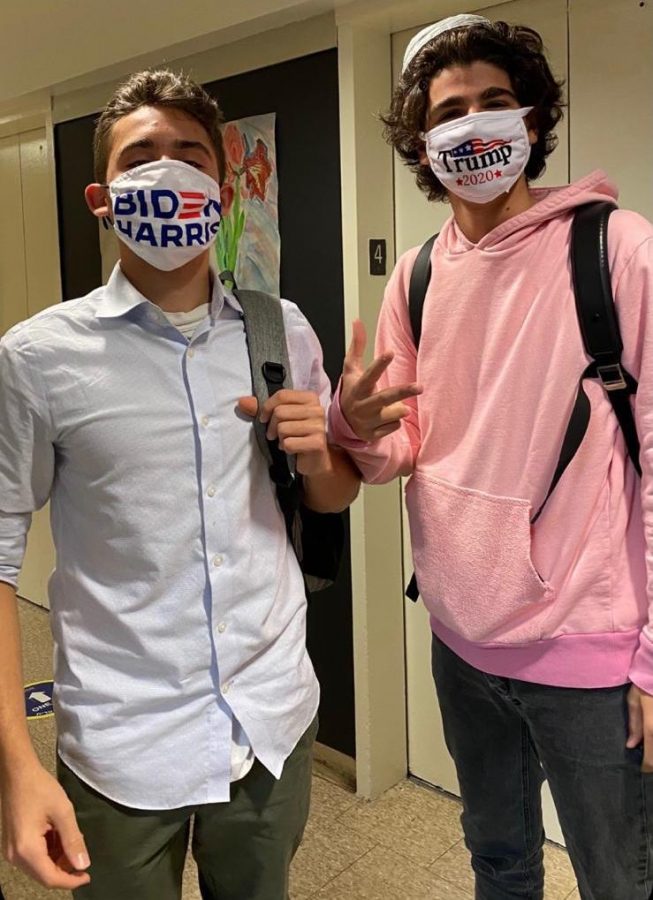Should Teachers’ Political Opinions be Censored?
During the first week of school, the Ramaz students attended an assembly regarding the upcoming presidential election. While the students were quite vocal about their political opinions and showed their support with Biden masks and Trump flags, the faculty seemed to hold back. One may wonder how the teachers felt about the topic, and if they were even permitted to share those opinions with the students. This election in particular has been so polarizing, and it seems to have brought out the worst in people. When a political or religious controversy enters its way into Ramaz –be it in a conversation, a club, or a class– can teachers share their thoughts with students, or, must they remain neutral?
Evidently, there are pros and cons to allowing teachers to share their opinions. On one hand, students are young and impressionable. An educator’s thoughts on a subject could be perceived the wrong way, turning respectful discussions into disrespectful arguments. Teachers are in a powerful position, and students might be afraid to argue with the people who are writing their report cards and grading their tests. Alternatively, hearing what your teacher has to say provides an opportunity to learn new perspectives, have meaningful discussions, and possibly reveal what you think or add to it. Additionally, the students are young adults, not children, and they can form their own opinions.
According to Rabbi Stochel, “We do not have an established policy. We don’t want the classroom to be a place where current events, contemporary moral issues, politics, history, culture are not addressed because we want our students to be exposed to multiple points of view. There is a slight distinction between religious opinions and political opinions. Religious opinions are more complicated because the school is an Orthodox school.” Rabbi Stochel also added that views contrary to the mission of the school should still be discussed.
Students and teachers have varying opinions on how much teachers should be sharing with their students. A small discussion in school can prepare students for larger life situations, as, both in and outside of who have different political and religious opinions than them. Most students agree that it is important to recognize that political and religious controversies can be polarizing, but it is equally if not as important to note that a civil conversation is the best way to somewhat settle things, even if it means you continue to disagree. What is most important is that one not only learns a different opinion, but also how to have a respectful conversation. This is how students can grow.
“I think that as long as it is done appropriately in the correct environment, teachers and students should be able to share their religious and
political opinions,” said Jordan Mittler ’22. Mittler proposed that it is best for teachers to share their opinions in a way that is not criticizing someone else’s point of view, rather respectfully debating a specific topic. In addition, the correct environment for these conversations is during a class discussion or during an after school club “I think that teachers should be able to share them, but…they shouldn’t force an opinion upon students…. [rather] they should encourage students to form their own opinions,” said Avital Sarao ’24.
Dr. Gaylord said, “Teachers should share their religious and political opinions–assuming those opinions are germane to the subject at hand. Education thrives on diversity of opinion. The best kind of education is one that exposes students to a whole range of ideas, beliefs, philosophies, and perspectives. Real education dies when it becomes insular and afraid of outside ideas. So I believe that teachers sharing their opinions on big life issues is only a good thing–as long as they stop short of proselytizing.”
At Ramaz, one area where this could be problematic is the topic of religion. As a Modern Orthodox school, Ramaz values the Torah and the principles of Judaism and Zionism. If a teacher did not agree with these morals and was to offer their opinion to students, what exactly would that mean? Rabbi Albo believes, “Religious teachers, in a religious institution, are expected to teach about religion. If there is something happening in the political sphere or in current events that intersects with religion, then it is appropriate for a discussion within that facet. I stay away from politics and feel that all teachers should in their classrooms.” Rabbi Albo also advised that even history teachers should not share political opinions, as they are not political science teachers or news anchors. However, he added that Ramaz can choose to have events that involve political discussions.
Like the rest of society, Ramaz is divided during this time. Political differences have infiltrated every facet of students’ lives – the streets, social media, retail stores, and even families. However, regardless of these differences, it is important to be able to have a civil conversation. People will not always agree, but they must agree to graciously disagree. There are many different ways to look at the topic of teachers sharing their religious and political opinions. It is possible that these conversations could help both teachers and students understand the opposing opinion, or it could erupt into a hectic argument.



